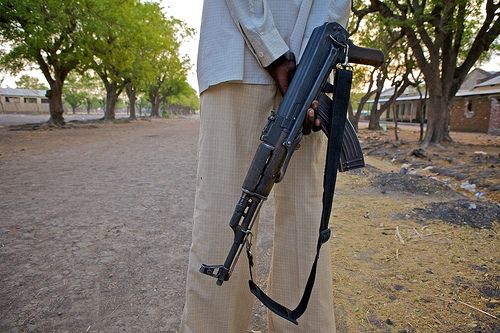On July 12th the International Criminal Court (ICC) charged Sudanese President Omar al-Bashir with genocide and issued a second arrest warrant against him. This came as no surprise to most observers since this is not the first time President al-Bashir has been charged by the ICC.
What is surprising, however, is the conflicting international response to the ICC's charges. There is no international consensus on the legitimacy of the charges. Because of this debate, President al-Bashir has been able to slip under the judiciary radar and continue to travel outside of Sudan.
On one side of the debate, the European Union and most Sudan-related advocacy groups strongly support the ICC charges and call for the immediate arrest of al-Bashir. They argue that Sudan has waited long enough for justice and that waiting any longer would be unfair to those who have been hurt by al-Bashir's alleged actions. They uphold the power of the ICC to issue arrest warrants and argue in support for the ICC's mission and legitimacy in prosecuting war crimes and genocide.
The African Union, the Arab League and Turkey, however, believe that the arrest warrant is unfounded and refuse to recognize it as legitimate. While Turkey actually denies the existence of genocide, the African Union and the Arab League simply demand that they take control of the court proceedings and try al-Bashir before an African court. They claim that the ICC has a bias against Africa and point to the fact that every ICC case has investigated events in Africa.
In another blow to the ICC's legitimacy, President al-Bashir travelled to Chad last week to visit with Chadian President Idriss Déby. Despite the fact that Chad is a confirmed member state of the ICC, President Déby publicly swore he would not arrest al-Bashir during the visit—a promise Déby kept. This event highlights the ICC's issues with enforcement: it can charge anyone, but if it cannot bring the defendant to trial its words are meaningless. It is a serious blow to the ICC's legitimacy when even its member states disagree with the indictments and refuse to act on them.
China has distanced itself from the recent warrant debate altogether, although it condemned al-Bashir's original arrest warrant when it was first issued. China is in a difficult position regarding the ICC charges; while it wants to portray itself as a "team player" and a benevolent power, China has substantial oil assets in Sudan. Backing out is China's best course of action because it neither condemns the ICC's new warrant—an action that would sour its relations with the West—nor does it demand al-Bashir's arrest, which could hinder its oil supply from Sudan.
The American response is particularly conflicted. Although the U.S. is not a member state of the ICC and therefore has no judicial stake in the outcome of this feud, President Obama recently released a statement of strong U.S. support for the ICC arrest warrant and called for justice to be quickly served. It is only through bringing those responsible to justice, Obama argues, that Sudan can become a stable and democratic state.
U.S. Special Envoy Scott Gration, however, has long proposed a softer stance toward the Sudanese government and believes that the U.S. should engage al-Bashir in the interest of peace-building. He argues that the U.S. should focus its attention on building a peaceful arena for the 2011 referendum. In his view, it is more important to focus on Sudan's current security situation and address al-Bashir's charges after the referendum. Gration argues that this is the safest and most direct path to Sudanese security.
Again we might ask, "Why should we care about Sudan?" President al-Bashir still holds significant power in Sudan despite the Southern secession movement and he represents greater Sudan in the current referendum negotiations. His arrest could delay the referendum process which could lead to renewed violence and instability. On the other hand, allowing al-Bashir to ignore the indictment not only damages the ICC's authority but it could allow him to continue manipulating Sudan's political system in his favor. If al-Bashir unduly influences the 2011 referendum, the country could again collapse into civil war.
It is important to anticipate the repercussions of al-Bashir's arrest and plan accordingly to mitigate any dangerous political or military reaction. After all, al-Bashir is still President of Sudan; his future is linked to Sudan's future. If the situation is not properly handled by both Sudan and the international community, we may see more violence in a country tired of war.
